Intercom is a well-known player in the customer support space. It’s sleek, smart, and packed with help desk software features, especially when it comes to live chat and automation. But as your business evolves, it’s not uncommon to find that what once worked well is now missing the mark. ❌
Maybe your team has grown, and you need more flexibility in your help desk workflows. Maybe you’re exploring more affordable pricing options. Or perhaps you want a tool that better fits your day-to-day operations with a user-friendly interface and without adding complexity or a stack of extra software. 🧩
And if you’re looking for something that brings support, sales, and finance together, Method CRM may be the right fit.
Here at Method CRM, we’ve been supporting QuickBooks-based businesses since 2010. Method is loved by small and mid-sized businesses across a range of industries for its two-way QuickBooks sync, end-to-end sales automation, and no-code customization. In this guide, we’ll walk you through 10 of the best Intercom alternatives in 2026. We’ll cover key features like chatbots, shared inboxes, automation tools, and more. You’ll learn what each tool is best at, who it’s ideal for, and how they compare in terms of cost and usability. ⚙️🛠️
Let’s start with the must-have features to look for when comparing your options.
Table of Contents
- 1. Method CRM – Best all-in-one for QuickBooks users
- 2. Zendesk – Robust ticketing and enterprise help desk
- 3. HelpCrunch – Multichannel support with pop-ups & email
- 4. Crisp – Budget-friendly chat widget + shared inbox
- 5. Freshdesk – Omnichannel support & Freddy AI
- 6. HubSpot Service Hub – Tied to marketing automation
- 7. Drift – Sales-focused conversational marketing
- 8. Help Scout – Simple support for startups
- 9. Tidio – AI live chat for ecommerce
- 10. Olark – Lightweight live chat only
Features to look for in an Intercom alternative
Not all customer support tools are built the same. Some are great at managing conversations, while others shine when it comes to automation or CRM integration. The key is figuring out what your team really needs and what your next tool must deliver to avoid frustration with your new software.
Here are the must-have features to keep an eye on when choosing the right alternative.
Shared inbox & help desk ticketing 📩
When your support team grows beyond one person, a shared inbox becomes essential. It keeps everyone on the same page, quite literally. The best Intercom alternatives offer a simple, unified view where team members can see, reply to, and assign messages without the chaos of crossed wires or duplicate replies.
A feature that makes the biggest difference, however, is a built-in help desk ticketing system. With clear ticket statuses, priorities, and deadlines, nothing gets lost, and customers don’t get left hanging. There are also bonus points to hand out if the tool includes internal notes, tags, or mentions for easy collaboration behind the scenes.
AI-powered chatbots & canned responses 🦾
Let’s be honest, customers don’t want to wait—and neither do you. AI-powered chatbots and canned responses are your support team’s secret weapons for keeping response times snappy and expectations met. A great bot handles common questions, nudges users in the right direction, and steps aside when a human needs to jump in.
Look for tools where you can customize the bot’s tone and create response templates that sound like your brand. That way, your customer communication feels personal, even when it’s automated.
Self-service knowledge base 💡
If your team is answering the same handful of questions on repeat, it’s time to build a solid knowledge base. A searchable, self-service library empowers website visitors to find what they need when they need it, without starting a chat or submitting a ticket.
The best options are easy to update, mobile-friendly, and connect with your live chat to suggest relevant articles in real time. It’s a shared victory all around, where customers feel smart and your agents stay focused on more complex tickets.
CRM & customer data sync 🔄
Great customer support is all about context. A strong Intercom alternative should connect with your CRM so agents can see past purchases, open tickets, and recent conversations, all in one view. No more asking customers to repeat themselves.
Tools like Method CRM take it even further by letting you build custom workflows around that customer data. That means you can automate follow-ups, personalize support journeys, and keep your sales and support teams in sync.
Affordable, transparent pricing 💰
Let’s talk pricing, because it’s a big deal. One of the reasons businesses report for seeking out Intercom alternatives is the rising cost and surprise add-ons. In contrast, many other tools offer clear, upfront plans with free trials or entry-level tiers that are useful for small businesses.
But don’t just look at the sticker price. Check what’s included in each plan: Do you get access to chatbots? Help desk features? CRM sync? Or will you need to pay extra for basic automation and reporting? Find a tool that gives you the functionality you need without forcing you to jump through upgrade hoops.
The 10 best Intercom alternatives in 2026
Intercom is a solid tool, but it’s not a perfect fit for everyone. We’ve rounded up the 10 best Intercom alternatives in 2026, from budget-friendly chat tools to all-in-one support platforms. Each one brings something different to the table, so you can find the right match for your team, your tech stack, and your customers.
1. Method CRM – Best all-in-one for QuickBooks users
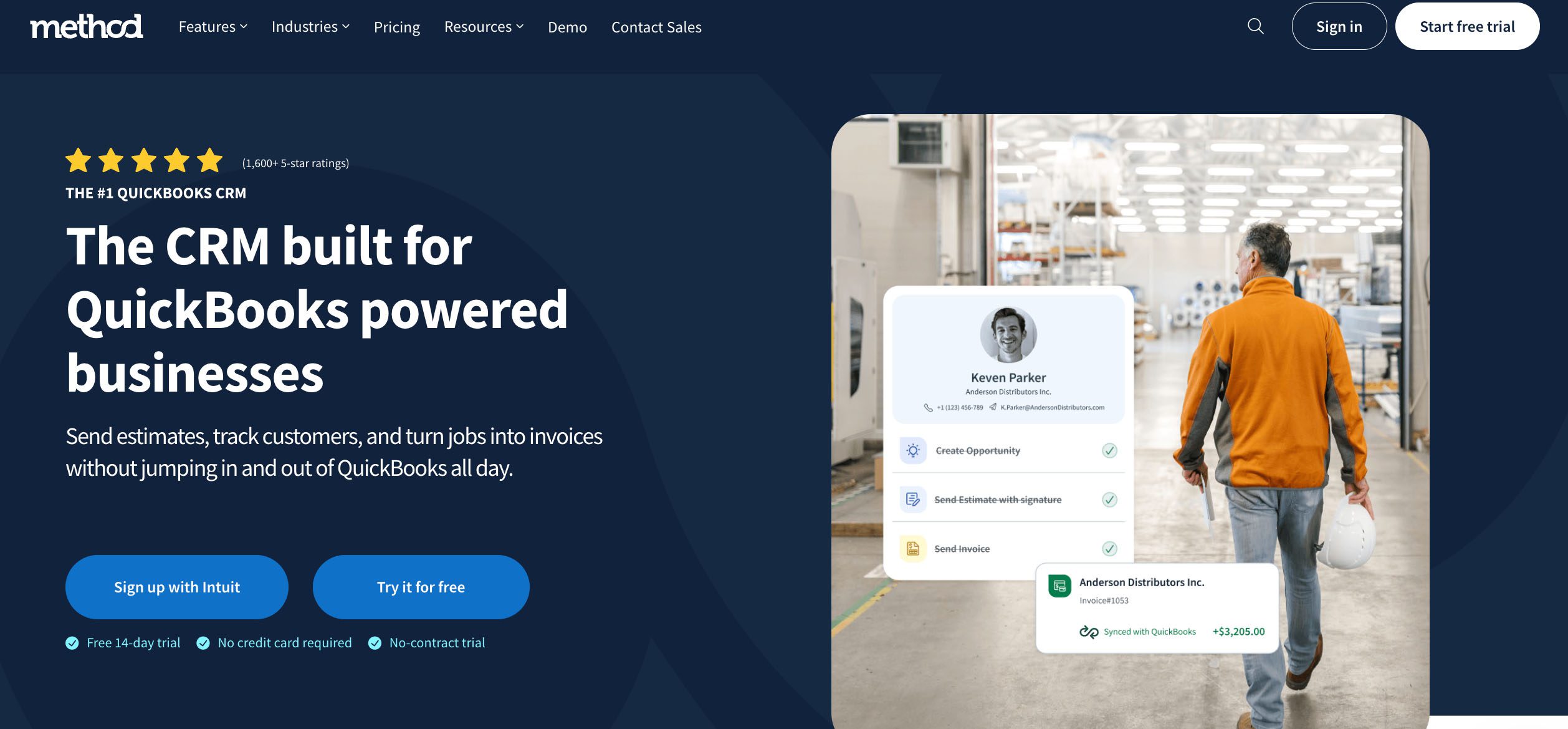
Key features:
- Two-way, real-time sync with QuickBooks Online.
- Fully customizable workflows with no coding.
- Customer portal for easy self-service and updates.
- Friendly onboarding support to get you up and running.
Why it stands out
If your support team works closely with your finance or sales crew, Method is a game-changer. It’s the only CRM on this list that offers true QuickBooks integration, letting your support team see invoices, customer info, and payment status in real time.
Plus, it means you don’t have to juggle five different tools. If there are specific help desk features/workflows you love from Intercom, Method can build them for you. And if there are features you wish Intercom had, Method can build those for you too—no code or developer required. Method acts as your all-in-one platform for customer communication, support, and CRM, working the way you do—not the other way around.
Base price: $27 per user/month
Best for: Small-to-mid sized businesses using QuickBooks and needing a full suite of tools with automation and deep CRM capabilities.
2. Zendesk – Robust ticketing and enterprise help desk

Key features:
- Powerful ticketing system with workflows and SLA rules.
- Advanced routing, tagging, and reporting.
- Omnichannel support: email, chat, phone, social media.
- AI tools and macros for efficiency.
Why it stands out
Zendesk’s core strength lies in managing high volumes of support tickets across large teams and multiple channels. With features for advanced automation, custom roles, and analytics, it’s ideal for larger support operations.
Base price: Starts at $19/month per agent
Best for: Enterprises or growing teams needing a tried-and-tested help desk system with serious automation power.
3. HelpCrunch – Multichannel support with pop-ups & email
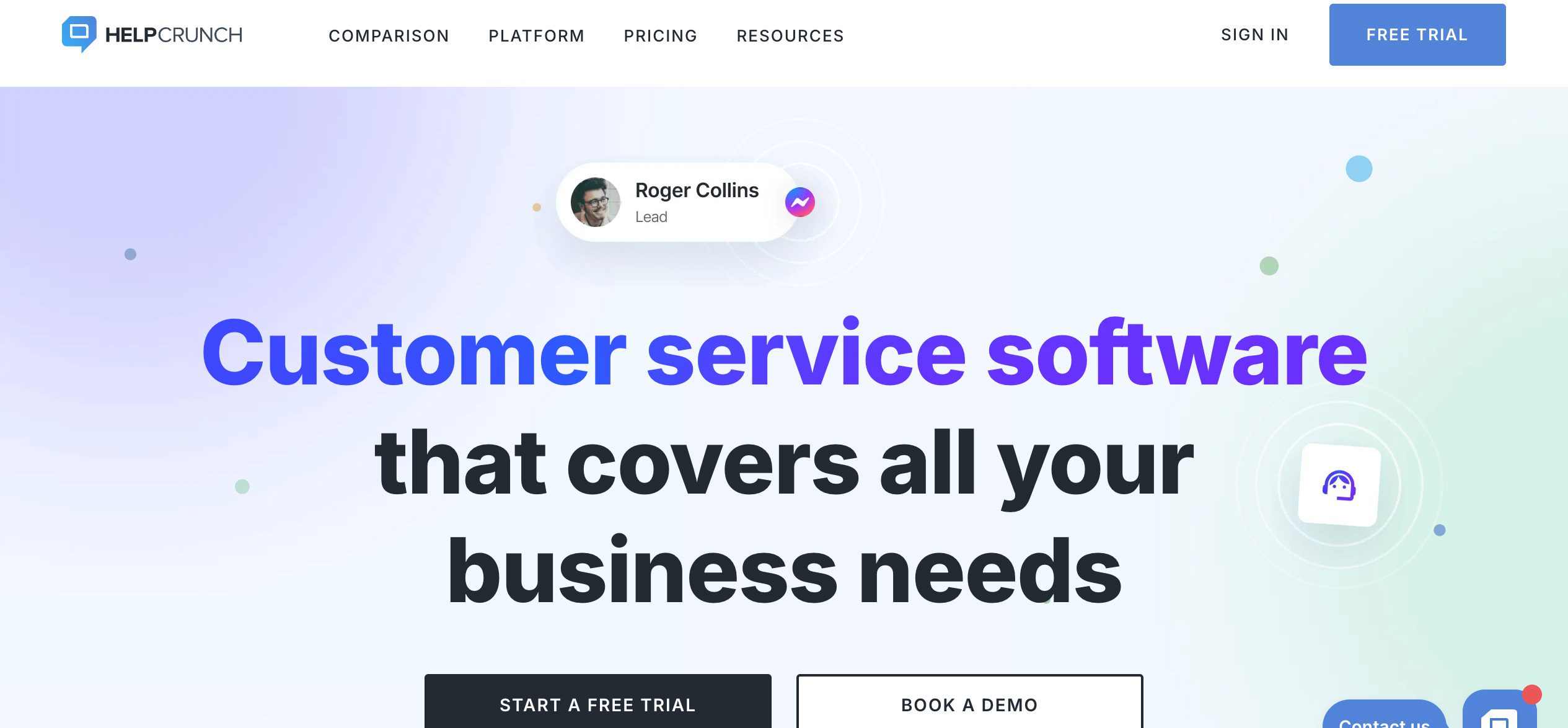
Key Features:
- In-app messages, email marketing, and chat widget.
- Smart chatbot features.
- Customizable pop-ups for lead capture.
- Built-in knowledge base.
Why it stands out
HelpCrunch blends live support with marketing and engagement tools. It’s great if you want to talk to customers and nudge them toward action without switching platforms.
Base price: Starts at $12/month per team member
Best for: SaaS teams and startups looking for multichannel support and email marketing tools under one roof.
4. Crisp – Budget-friendly chat widget + shared inbox
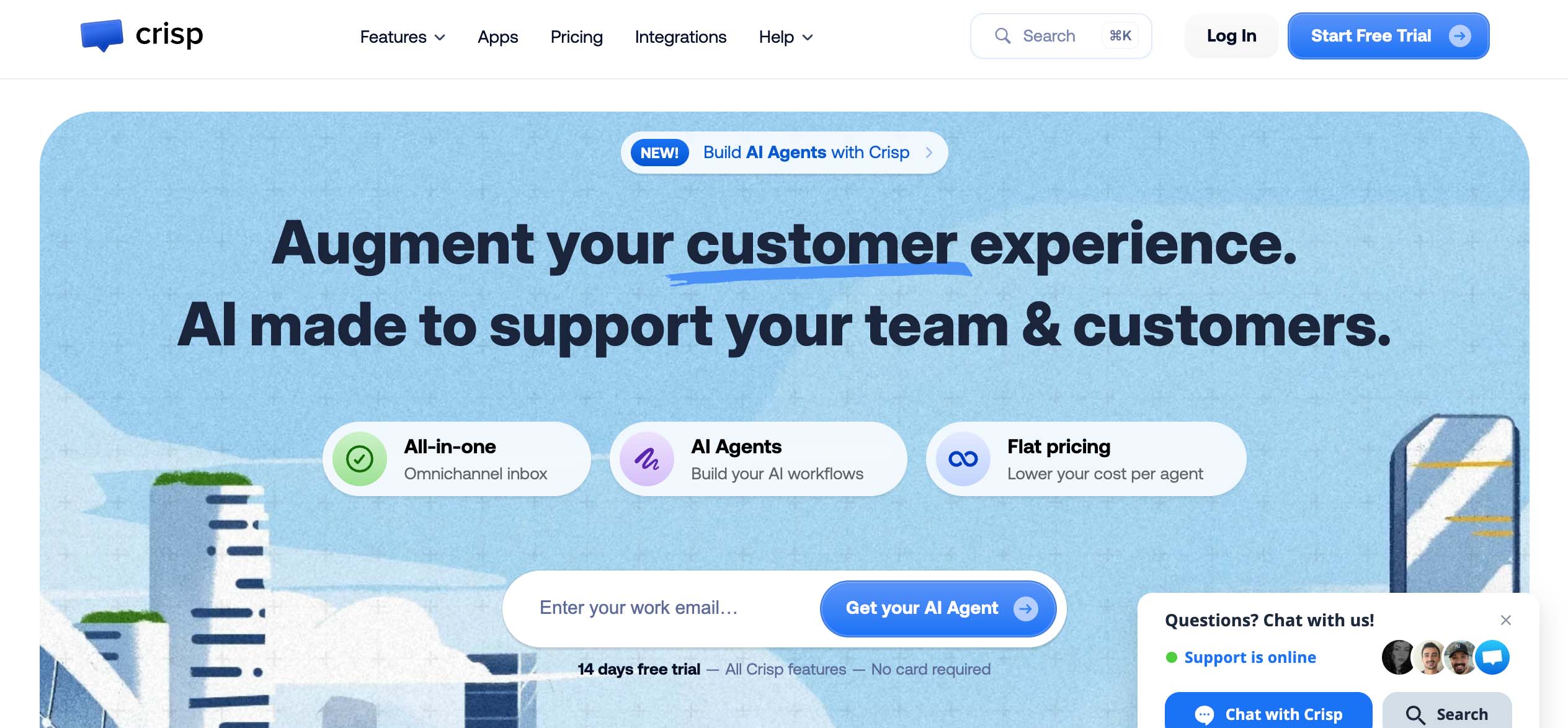
Key features:
- Clean, easy-to-use live chat widget.
- Shared inbox with tagging and automation.
- Co-browsing and real-time translations.
- Knowledge base and chatbot included.
Why it stands out
Crisp is like Intercom’s cool younger cousin. It’s simple, polished, and doesn’t overwhelm you with features you don’t need. It’s also one of the most affordable options with both chat support and CRM-like functionality.
Base price: Free plan available. Paid plans from $45/month/workspace
Best for: Startups or small teams wanting a clean interface and core features without the big price tag.
5. Freshdesk – Omnichannel support & Freddy AI
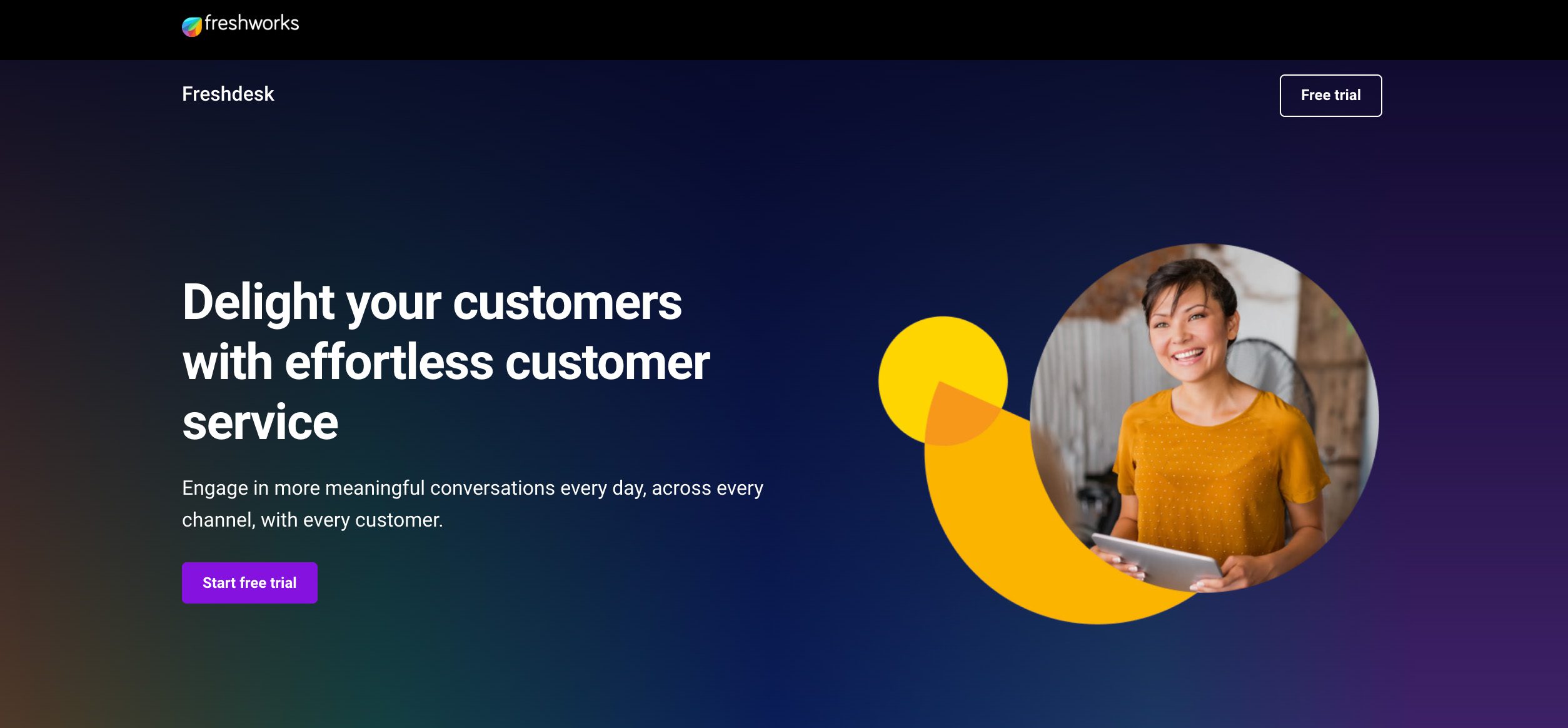
Key Features:
- Ticketing, email, phone, live chat, and social media on one platform.
- Freddy AI for ticket suggestions and field predictions.
- Workflow automation and canned responses.
- App marketplace for integrations.
Why it stands out
Freshdesk brings a powerful mix of AI and customer service software, all packed into a flexible platform. The Freddy AI tools are particularly helpful for support agents, giving recommendations and automation options that reduce workload.
Base price: Free plan available. Paid plans start at $15/month per agent
Best for: Growing teams that need robust omnichannel support with some AI magic.
6. HubSpot Service Hub – Tied to marketing automation
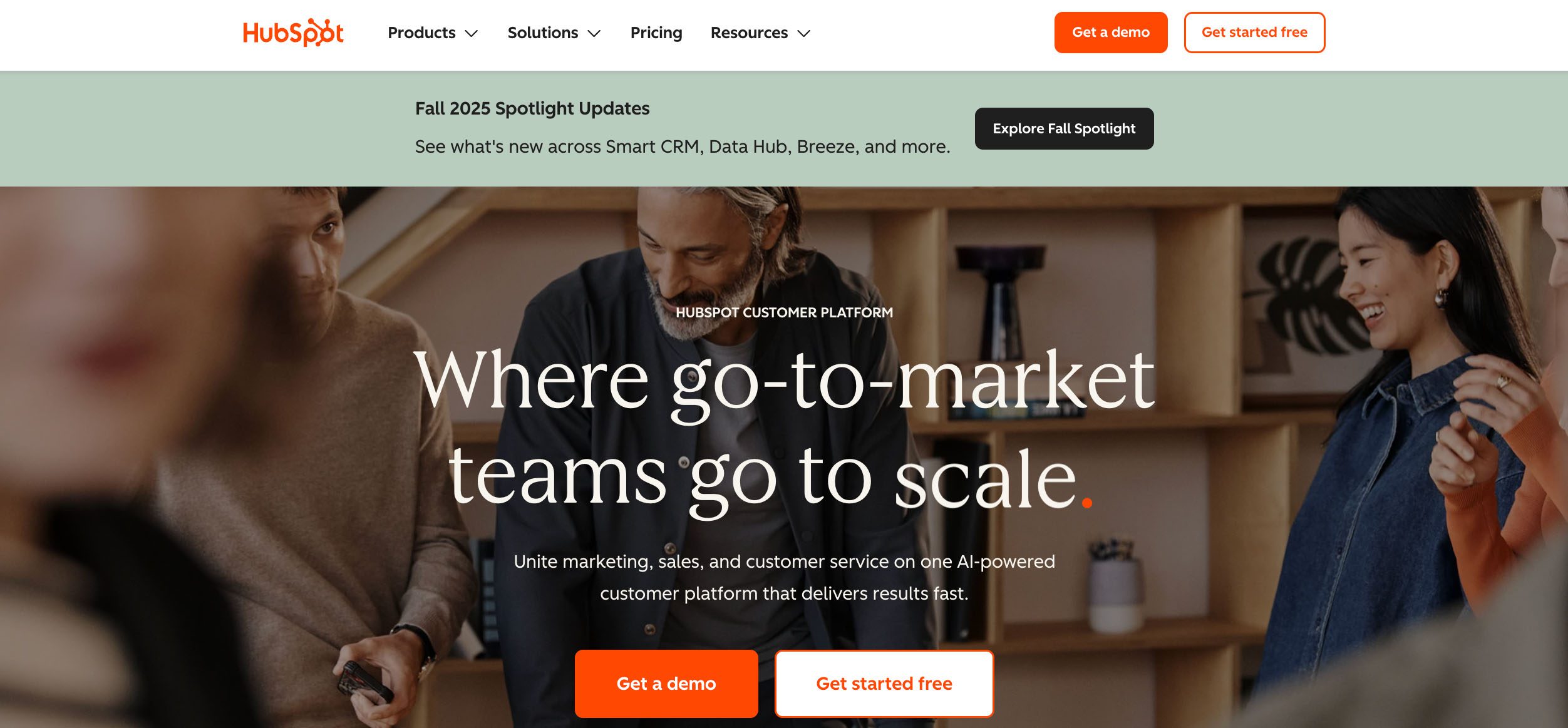
Key features:
- Shared inbox and ticketing tools.
- Integrated CRM and email marketing automation.
- Self-service knowledge base.
- Feedback surveys and reporting.
Why it stands out
If you’re already deep in the HubSpot ecosystem (or planning to be), their Service Hub is a natural fit. The tight connection between marketing, sales, and support means you’ll get a more unified customer journey.
Base price: Free tools available. HubSpot paid plans start at $9/month/seat
Best for: Marketing-savvy teams that want everything in one place, even if it means paying more as you grow.
7. Drift – Sales-focused conversational marketing
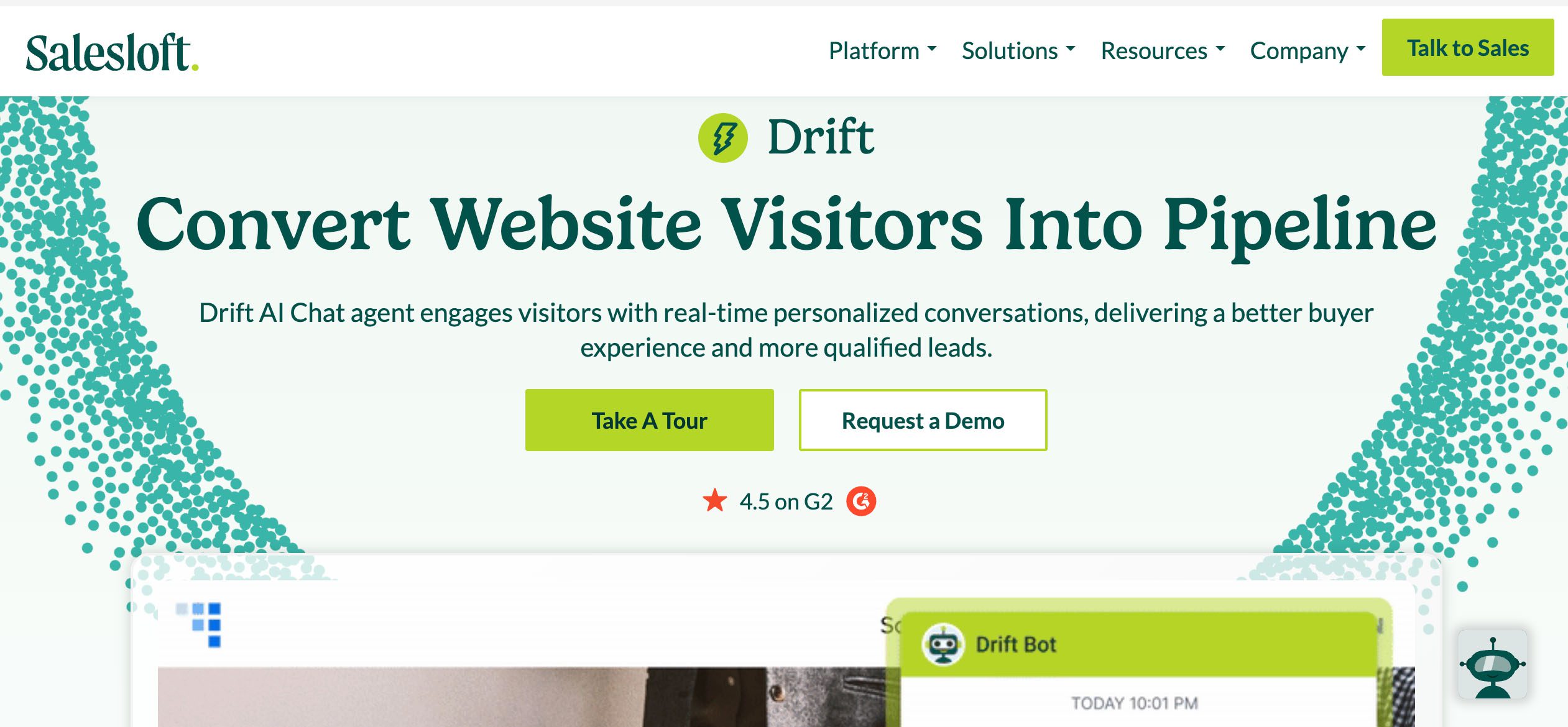
Key features:
- Live chat with lead routing and qualification.
- AI-powered conversation flows.
- Booking meetings from chat.
- Deep analytics on conversations.
Why it stands out
Drift is a Salesloft platform that is more about customer engagement than customer support. It’s built to capture, qualify, and convert leads through real-time conversations. The platform is ideal if your support team works closely with sales.
Base price: Contact sales
Best for: B2B companies focused on conversational marketing and high-value customer interactions.
8. Help Scout – Simple support for startups
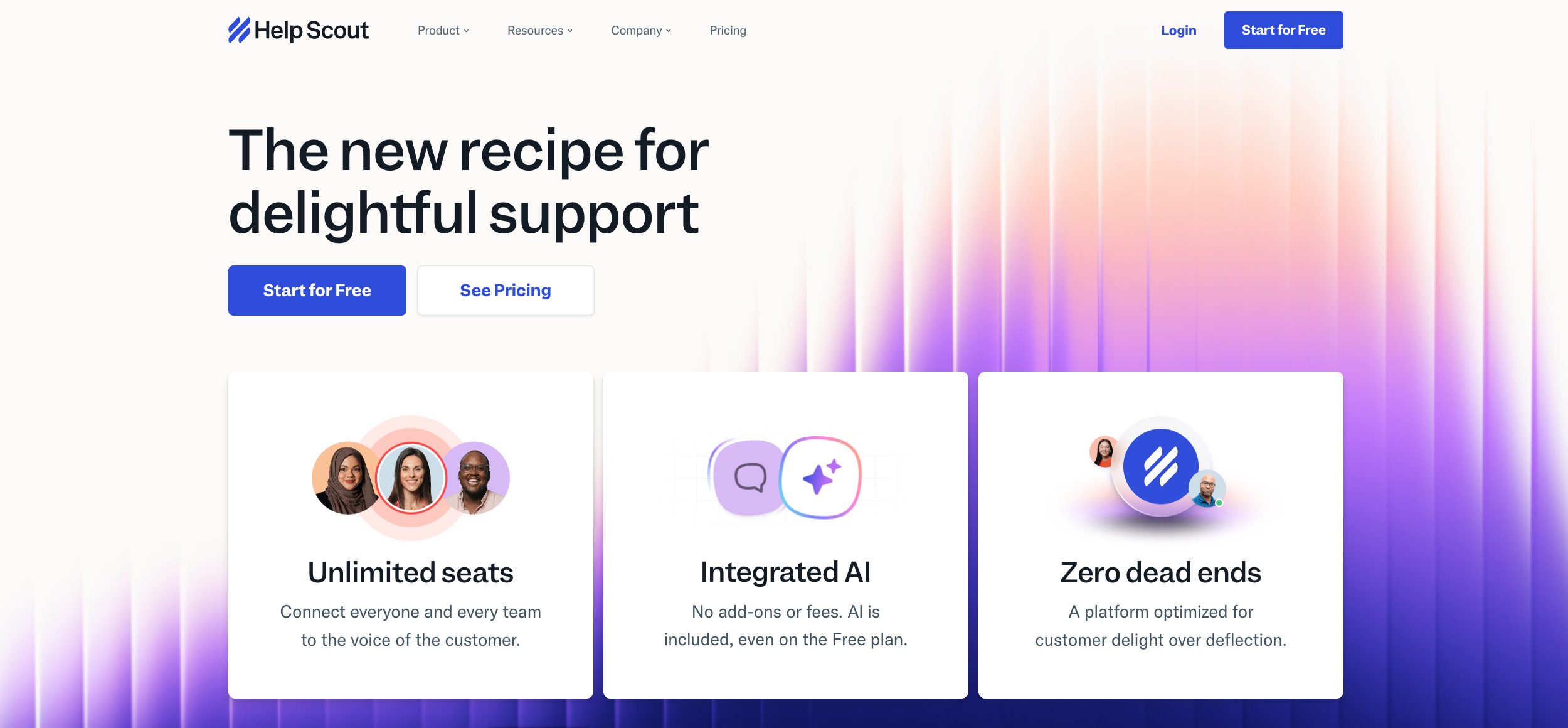
Key features:
- Shared inbox, tagging, and workflows.
- Integrated knowledge base.
- Lightweight live chat and reporting.
- User-friendly UI.
Why it stands out
Help Scout keeps it simple—but powerful. It’s great for smaller teams who want to deliver a professional customer experience without learning a complex system.
Base price: Free plan with 100 contacts per month and unlimited users. Paid plans start at $50/month for unlimited users, but increase in price based on the number of contacts helped per month.
Best for: Bootstrapped startups or nonprofits that want great customer support tools with no fuss.
9. Tidio – AI live chat for ecommerce
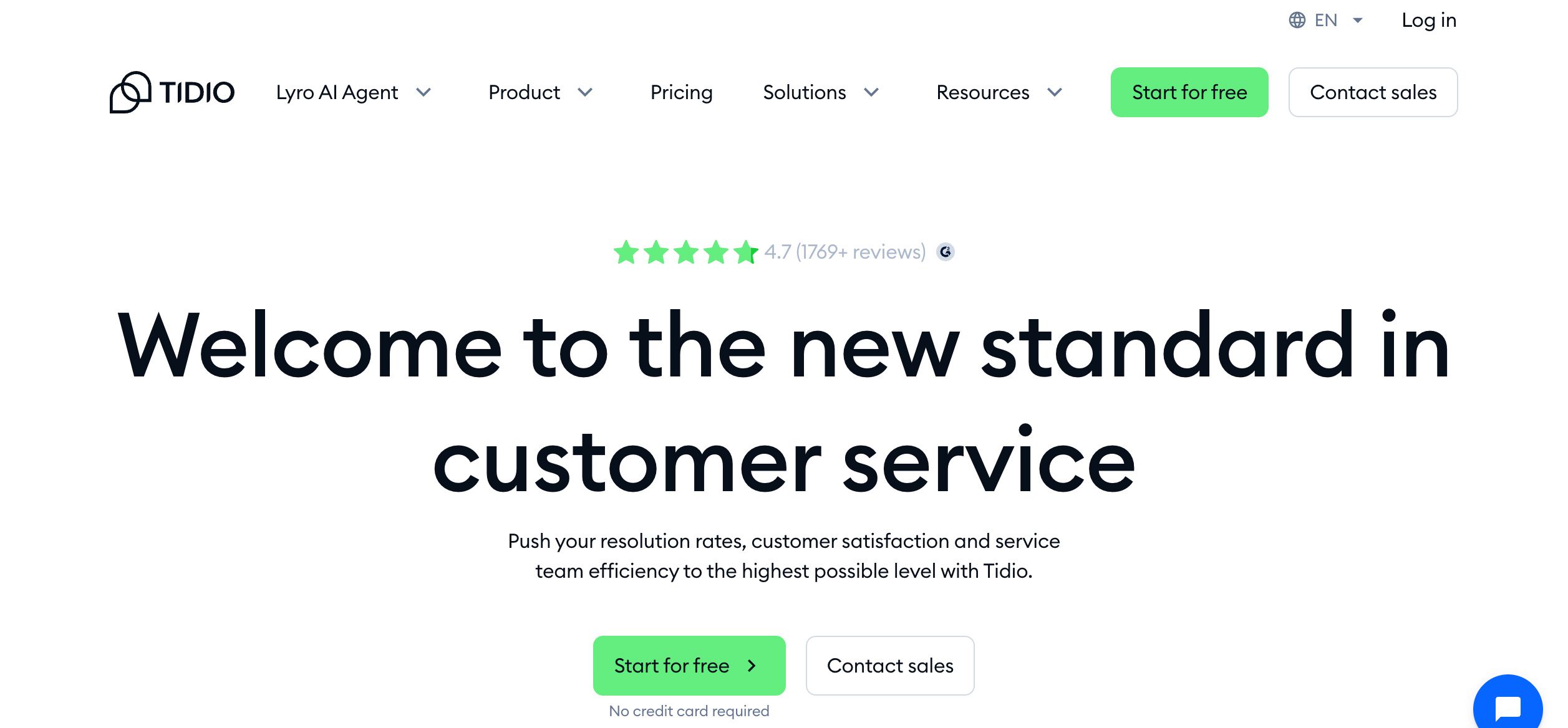
Key features:
- AI chatbot for 24/7 responses.
- Multi-channel: live chat, Messenger, Instagram, email.
- Real-time typing view and product card sharing.
- Has ecommerce integrations (Shopify, WooCommerce).
Why it stands out
Tidio is tailor-made for e-commerce. It handles everything from answering FAQs to nudging shoppers toward checkout with product suggestions, all within your site’s chat widget.
Base price: Free plan available for solo entrepreneurs. Paid plans start at $24.17/month and increase in pricing depending on the number of conversations.
Best for: Ecommerce stores wanting to reduce cart abandonment and boost customer satisfaction.
10. Olark – Lightweight live chat only
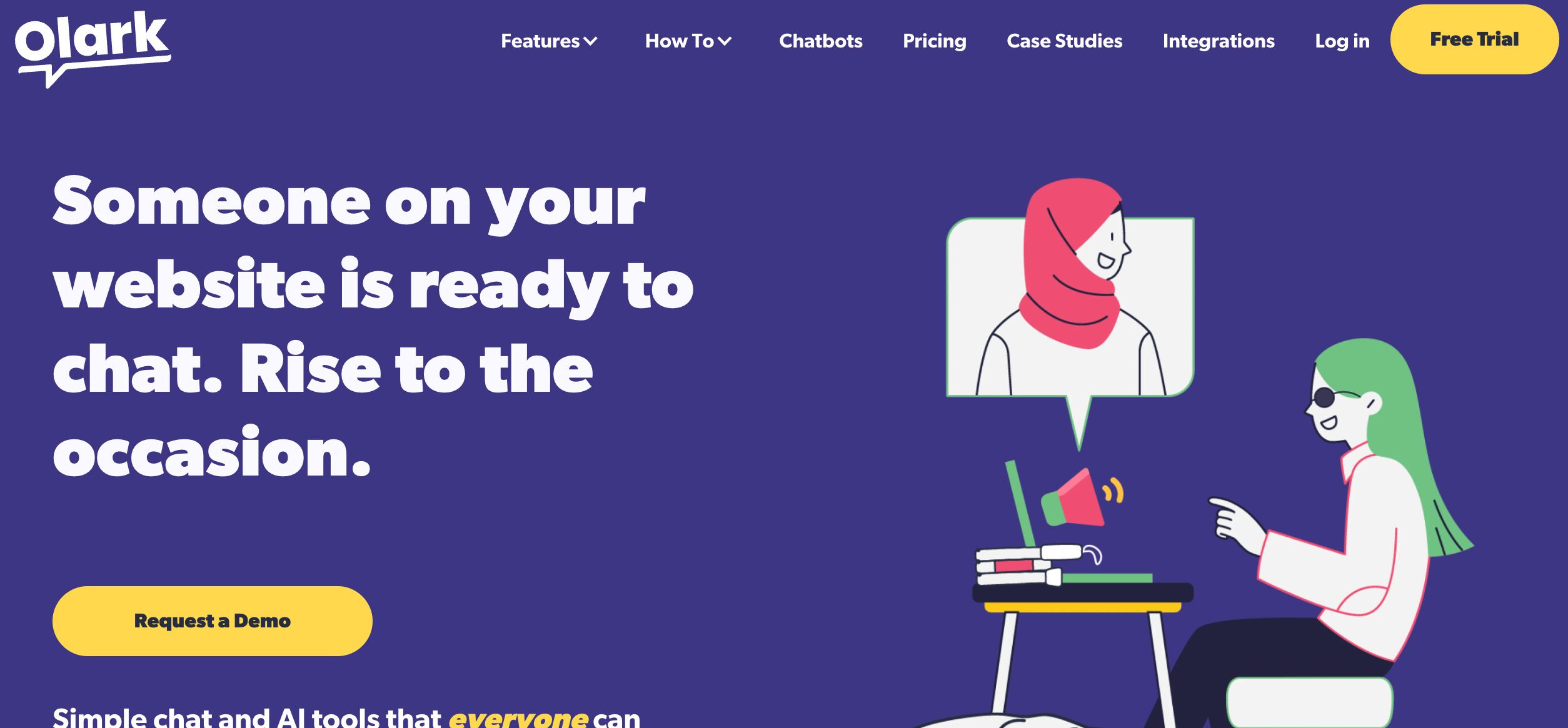
Key features:
- Live chat widget with basic automation.
- Chat transcripts and reporting.
- Custom chatbox styling.
Why it stands out
If all you need is a reliable live chat box—nothing more, nothing less—Olark delivers. It’s super easy to set up, and it gets the job done.
Base price: Starting at $29/month per seat
Best for: Teams who want a no-frills, live chat tool that works right out of the box.
How to choose the right tool
Switching support platforms isn’t exactly an easy decision, but if you’re already thinking about it, chances are your current tool isn’t quite doing the job. Choosing the right alternative means thinking beyond flashy features. Here’s how to make a smart, informed decision.
Map your support workflows and channels 🔀
Start by looking at how your support team actually works. Do you mostly rely on live chat software or automated messages? Are emails still a big part of your day-to-day? Do you need to handle support across multiple channels like WhatsApp, Facebook Messenger, and SMS?
Understanding your workflow, including what channels you use and how tickets are handled, helps you select a tool that fits, rather than one that makes your team work around its limitations.
For example, if your agents are constantly switching between email, chat, and social media messages, you’ll want a multichannel or omnichannel platform that brings it all together in one place. If your team routes support requests to different departments, make sure your tool has smart routing options and automation rules that save you from doing it manually.
Compare total cost of ownership (not just the sticker price) 💵
That “free plan” might look great at first glance, but be sure to check the actual cost of the tool once you add more users, channels, or advanced features. Some platforms rely heavily on add-ons, which means your total cost could climb fast, especially if you’re growing your communication channels.
Compare the pricing tiers, but also ask:
- What features are included in the base plan?
- Will I need to upgrade just to unlock essentials like chatbots, automation, or a knowledge base?
- Are there any hidden costs, like per-contact fees or support add-ons?
If you want predictable pricing with the opportunity to custom build your workflow, platforms like Method CRM are worth a closer look.
Check integrations with your existing stack 🔗
Your support platform doesn’t exist in a vacuum. Make sure it connects with the tools you already use, like:
- QuickBooks, if you need accounting and customer info synced in real-time
- Zapier, for building automated workflows without writing a line of code
- Slack, to keep your support team in the loop
- Other CRMs or API access if you need deep customization
The more seamless your integration setup, the less time your team will spend toggling between tabs, exporting CSVs, or re-entering data.
Look for platforms with native connections to your ecosystem, or strong third-party support through Zapier or open APIs. If you’re a QuickBooks user, Method CRM’s two-way, real-time sync is unparalleled .
FAQ: Intercom alternatives
Why would a business switch from Intercom?
A lot of businesses report moving on from Intercom because of rising pricing, steep learning curves, or needing features that require expensive add-ons. Others find that their customer support workflows outgrow the tool’s limits, especially when it comes to automation, customization, or integration with other platforms.
Are there free Intercom alternatives?
Yes, a few tools like Tidio and Crisp offer a limited free plan, and Olark has affordable starter options. Just keep in mind that free plans often come with tight limits like fewer users, basic features only, or no access to chatbots, knowledge base, or automated workflows.
Can these tools handle multichannel support like Intercom?
Some do and some don’t. If you need to manage customer conversations across live chat, email, SMS, and even social media, look for tools that clearly offer multichannel or omnichannel support.
How steep is the learning curve with Intercom alternatives?
It depends. Some tools, like Help Scout and Crisp, are known for their ease of use, while others, like Zendesk or HubSpot, offer more advanced features but may take longer to set up. If quick onboarding and real-person support matter to you, check what training and support resources are included.
Next steps: See Method in action 🙌
If you’ve made it this far, chances are you’re serious about finding the right messaging platform to support your team and your customers. Whether you’re aiming to streamline your entire support process, improve response times, or offer a more personalized experience to your website visitors, Method CRM is built to meet those business needs.
With Method, you can go beyond chat. Build out automated workflows, manage support tickets, sync customer and invoice data in real-time with QuickBooks, nurture customer relationships, and make communication consistent across your team. You’ll also get access to detailed metrics, so you always know what’s working and what’s not.
Best of all, you don’t have to figure it out alone.
Start your 14-day free trial or book a personalized demo to see how Method CRM can flex to fit your unique business. From custom builds to friendly onboarding support, we’re here to help you make a smooth switch.
Let’s make customer support simpler, smarter, and actually enjoyable—for your team and your customers. 🎯🚀






